NEWYou can now listen to Fox News articles!
This essay is adapted from Gregg Jarrett’s new book, “The Trial of the Century.”
I was barely a teenager when, one summer day, I plucked a single volume off my father’s densely packed bookshelf. That seemingly random act more than five decades ago shaped the contours of my life and inspired me to pursue a legal career.
The biography told the story of the finest trial attorney who ever lived, Clarence Darrow. I admired his passion for the law, his abiding sense of justice, and his unyielding commitment to civil liberties and intellectual freedom. A fearless iconoclast, he dared to confront prevailing beliefs. He opposed the increasing demands for social and religious conformity. Often a solitary figure, Darrow battled against government intrusion on individual rights.
These revered principles were in jeopardy during Darrow’s most famous case, the 1925 Scopes “Monkey” Trial. The sobriquet was derived from an evolutionary misconception that humans evolved from monkeys or other primates. Two years ago, I was granted access to the archives of the courthouse that still stands and obtained the original trial transcript on which “The Trial of the Century” is based.
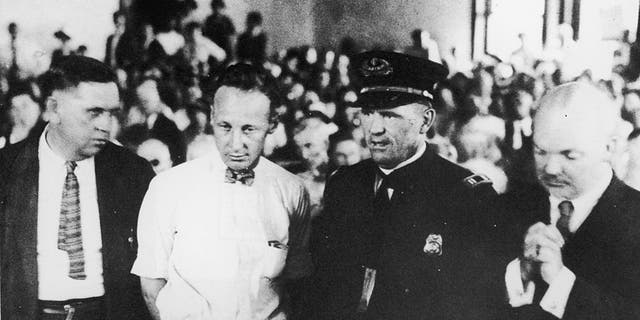
FILE – 1925: American teacher John Thomas Scopes (1900 – 1970) (2nd from L) standing in the courtroom during his trial for teaching Darwin’s Theory of Evolution in his high school science class, Dayton, Tennessee. Scopes’s case came to be known nationwide as the ‘Scopes Monkey Trial.’ (Photo by Hulton Archive/Getty Images)
What I discovered is that America might be a very different place today were it not for the courage of a young schoolteacher and his intrepid defense lawyer nearly a century ago who challenged in court a popularly enacted law that sought to suffocate scientific learning and freedom of expression or thought. Historians would describe it as a titanic clash between science and religion, or evolution versus creationism. But it was more than that. Hanging in the balance were the sacred, but fragile, values of free speech in America.
FREE SPEECH CONTROVERSIES ERUPT ON TODAY’S COLLEGE CAMPUSES
As the nation turned inward following World War I, a deep religious fervor swept the country. Christian fundamentalists led by William Jennings Bryan – three-time Democrat presidential nominee – pressured states into banning books on evolution. Tennessee was the first to pass a law making it a crime to teach Darwin’s cornerstone theory in public schools on the premise that it might conflict with the story of man’s creation as described in the Bible.
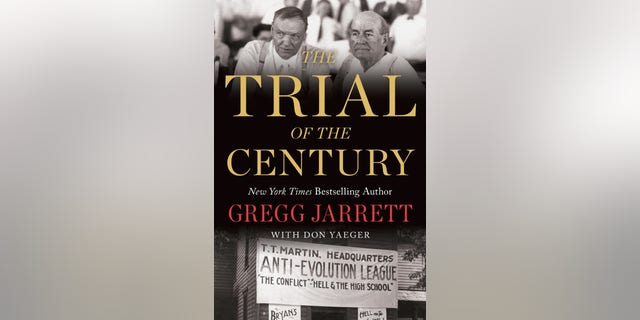
Within days, a polite and amiable substitute biology teacher by the name of John Scopes was arrested and charged under the new statute, even though the state-approved textbook contained a sub-chapter on the well-accepted theory of evolution. Bryan, gratified by his success in getting the law approved and determined to capitalize on it, joined the prosecution team to help convict Scopes.
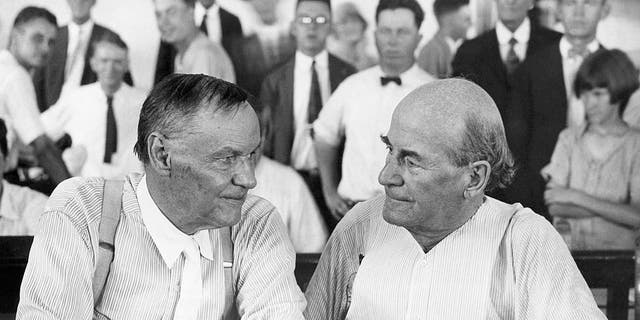
FILE – Clarence Darrow, a famous Chicago lawyer, and William Jennings Bryan, defender of Fundamentalism, have a friendly chat in a courtroom during the Scopes evolution trial. Darrow defended John T. Scopes, a biology teacher, who decided to test the new Tenessee law banning the teaching of evolution. Bryan took the stand for the prosecution as a bible expert. The trial in 1925 ended in conviction of Scopes. (Getty)
Sitting in his law office in Chicago reading about the case, Darrow was incensed. He had once been Bryan’s political ally. But the acclaimed attorney turned against his old friend when his religious ardor took direct aim at education, attempting to smother scientific advancement. At his own expense, Darrow volunteered to defend the 25-year-old schoolteacher who was under siege.
The ensuing trial became the biggest legal blockbuster of a generation and the most heralded courtroom drama in 20th-century America. Almost overnight, the small town of Dayton, Tennessee, was catapulted into the national spotlight.
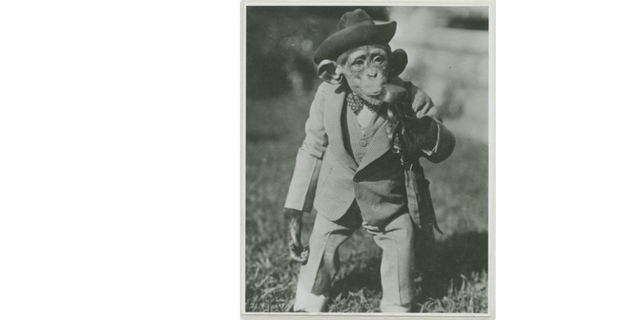
Before proceedings ever
began, the media dubbed it the
“monkey trial,” an evolutionary
misconception that humans
evolved from apes. The festival
atmosphere was fueled by carnival
acts like the chimpanzee named
Joe Mendi, who wore a bow tie
and suit to make him appear
human-like. People lined up and
paid money to have their photos
taken with him
Journalists the world over converged on tiny Dayton to witness what would surely be a spectacle. In the pre-television age, it was the first trial to be broadcast live on radio to a riveted nationwide audience. Newsreel cameras captured the courtroom proceedings, and the film was flown each day to Chicago for immediate distribution in movie theaters. Major newspapers across America published banner headlines and recounted every twist and turn in the trial.
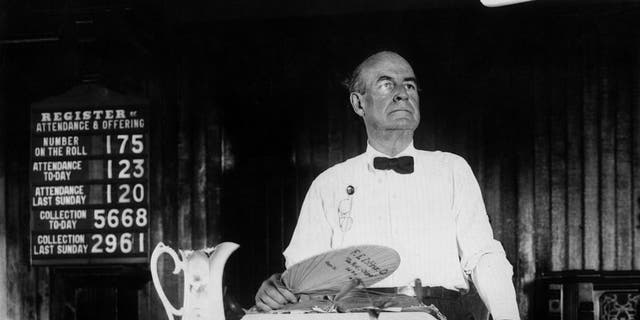
FILE – July 1925: Political leader and orator William Jennings Bryan (1860 – 1925), an anti-evolutionist, preaches from the pulpit at the Little Methodist Church during the Scopes ‘monkey trial’, South Dayton, Tennessee, at which he was director of the prosecution. He died of a cerebral haemorrhage a few days after the trial. (Photo by Hulton Archive/Getty Images)
Dayton itself took on a carnival-like atmosphere. Street preachers stood on top of cars to denounce evolution, while religious revivals were held on the outskirts of town. Salesmen and shops showcased souvenirs of the trial. Everywhere there were signs that read, “Read Your Bible!” A trained chimpanzee wore a bow tie and checkered suit as people lined up to have their photos taken with him.
OVER 100 HARVARD PROFESSORS AND STAFF STAND UP FOR FREE SPEECH WITH NEW COUNCIL: ‘WE ARE IN A CRISIS TIME’
As soon as the trial commenced, Darrow realized that he was staring down overwhelming odds as he stood alone to take on popular opinion. The courtroom was packed with religious supporters of Bryan. The jury was composed of devoted church members, only one of whom knew anything about evolution. Three had read no other book except the Bible. The presiding judge, an ordained minister, had been critical of evolution. His rulings from the bench consistently favored the prosecution. At one point, he held Darrow in criminal contempt for questioning his fairness.
Unjustly, Judge John Raulston foreclosed Darrow’s ability to present a legitimate defense of Scopes. At great financial cost, the lawyer had assembled a team of nationally renowned scientists and esteemed theologians to explain how evolution does not undermine the Bible’s account of the Divine Creation in Genesis. But Raulston would have none of it and refused to allow them to testify before the jury. He was determined to convict Scopes.

The trial shifted public opinion and spelled the beginning of the end for the kind of religious intrusion that our Constitution forbids. (Fotosearch/Getty Images)
Down, but not defeated, Darrow did something extraordinary. In a daring and consequential move, he called prosecutor Bryan to the witness stand as an expert on the Bible. The savvy defense attorney knew that the outsized ego of the fundamentalist icon would never allow him to resist. Sure enough, Bryan took the bait and insisted that he testify.
Fearful that the second-floor courtroom might collapse under the weight of the overflowing gallery, the judge moved the trial outdoors to a large platform that was left over from July 4th festivities. This set the stage for the climactic moment when Darrow, face-to-face, challenged Bryan’s interpretation that everything in the Bible should be accepted literally as written.
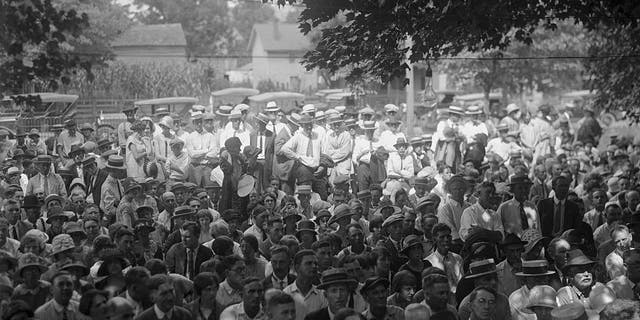
(Original Caption) The Scopes trial is moved outside here, due to excessive heat.
CLICK HERE TO GET THE OPINION NEWSLETTER
With thousands looking on, Darrow’s cross-examination was mesmerizing and bold. With resolute patience and penetrating questions, he dismantled the veneer of his adversary’s strident beliefs. The more Bryan fumbled, the more he fanned himself in the searing heat. As sentiment started to shift, derisive laughter from the crowd only inflamed Bryan’s panic.
Darrow’s relentless prodding and inescapable logic destroyed his nemesis. He was thoroughly discredited. Bryan had doggedly clung to a righteousness that he mistakenly ascribed to virtue. He forced his religious ideology on others by helping to enact a misbegotten law. It became the sad and tragic epitaph of a once-great statesman. Days later, while still in Dayton, Bryan laid down for a nap. A broken man, he never woke up.
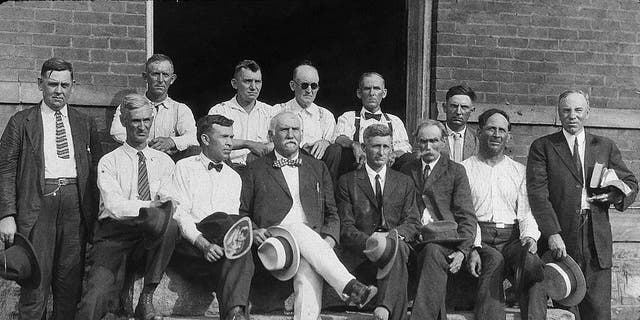
FILE – The jury and Judge John T. Raulston (standing at far right) on the steps of a building during the ‘Scopes Monkey Trial’ in which school teacher John Scopes was prosecuted for teaching the theory of evolution in violation of Tennessee’s Butler Act, Dayton, Tennessee, July 1925. (Photo by /Getty Images)
The New York Times described the epic showdown as “the most amazing court scene in Anglo-Saxon history.” The brilliant and devastating questioning of Bryan turned the tide in education. It shifted public opinion and spelled the beginning of the end for the kind of religious intrusion that our Constitution forbids. The wonders and benefits of science were untethered. Free speech rights were rescued and solidified. Generations of Americans became Darrow’s beneficiaries.
CLICK HERE TO GET THE FOX NEWS APP
Darrow believed that the human mind is an open canvas of possibilities. We should be free to paint it with our own brushstrokes. And so, the old warrior came to the aid of a Tennessee educator who dared to teach evolution in a time when simple minds and timid men surrendered to the zealotry of public pressure and governmental overreach. The stunning outcome foreshadowed the fraught culture wars that would shape America throughout the century and beyond.
Darrow’s seminal defense of free speech, scientific acceptance and intellectual empowerment helped form the legal bedrock on which our civil liberties depend today. These cherished principles are as relevant now as they were nearly 100 years ago when a young schoolteacher and his legendary lawyer fought for the indispensable proposition that no one should be told how to think.
It truly was the trial of the century.
CLICK HERE FOR MORE FROM GREGG JARRETT